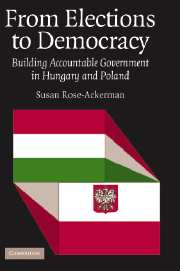Book contents
- Frontmatter
- Contents
- List of Tables
- Preface
- 1 Policy-Making Accountability and Democratic Consolidation
- 2 Alternative Routes to Policy-Making Accountability
- 3 Legacy of the Past
- 4 External Accountability and the European Union
- 5 Oversight
- 6 Decentralized Political Accountability
- 7 Public Participation in Policy Making: Government Procedures
- 8 Civil Society Groups: Overview
- 9 Environmental Advocacy Organizations in Hungary
- 10 Student and Youth Organizations in Poland
- 11 Democratic Consolidation and Policy-Making Accountability
- Appendix 1
- Appendix 2
- References
- Index
8 - Civil Society Groups: Overview
Published online by Cambridge University Press: 23 July 2009
- Frontmatter
- Contents
- List of Tables
- Preface
- 1 Policy-Making Accountability and Democratic Consolidation
- 2 Alternative Routes to Policy-Making Accountability
- 3 Legacy of the Past
- 4 External Accountability and the European Union
- 5 Oversight
- 6 Decentralized Political Accountability
- 7 Public Participation in Policy Making: Government Procedures
- 8 Civil Society Groups: Overview
- 9 Environmental Advocacy Organizations in Hungary
- 10 Student and Youth Organizations in Poland
- 11 Democratic Consolidation and Policy-Making Accountability
- Appendix 1
- Appendix 2
- References
- Index
Summary
Participation rights mean little unless organized groups exist that are willing to be part of the process. If groups simply organize street protests or engage in self-help, a more open administrative process will have minimal impact. Enhanced participation rights are not a viable option if few individuals and organizations would take advantage of the opportunity offered and if those few represent a biased set of interests and expertise.
This concern is a real one in Central Europe. Business firms and trade unions have umbrella organizations, some with official status. Statutory self-governing institutions exist for regions and municipalities and for groups such as students, the professions, and academic researchers. Religious bodies sometimes take positions on contemporary policy debates, especially the Catholic Church in Poland. Organized political parties contest elections, and those in opposition are active critics of the incumbents. Nevertheless, there is one important weakness. Only a small portion of the nonprofit sector engages in advocacy, and it is poorly funded and lacks broad-based membership.
The Central European countries distinguish between three different types of organizations – other than political parties – that play a role in policy making and implementation processes. The first group includes “jurisdictional” organizations, mostly self-governing local and regional governments, but the category also includes groups such as university students and sometimes even government agencies that will be affected by the policy in question. They are consulted mainly because they will play a role in implementing the policy.
- Type
- Chapter
- Information
- From Elections to DemocracyBuilding Accountable Government in Hungary and Poland, pp. 163 - 174Publisher: Cambridge University PressPrint publication year: 2005



